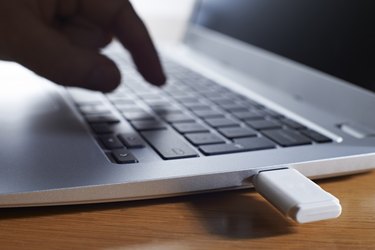
A Universal Serial Bus (USB) flash memory drive is essentially a small hard drive that allows you to store data in a compact location. USB flash memory drives work slightly differently than other types of memory storage devices, and they are more likely to become corrupted over time. If your flash drive is malfunctioning, the only sure way to fix the issue is to format the drive back to its original factory settings. Unfortunately, the solution to the malfunction will wipe out all of the data on the drive—but all of that data can then be restored with a recovery tool.
Reformat the Flash Drive
Video of the Day
Step 1
Connect the USB flash drive to one of your computer's USB ports. Close down the pop-up window that appears.
Video of the Day
Step 2
Open the "Start" menu and select "My Computer." Locate the drive letter that corresponds to your USB flash drive.
Step 3
Right-click the drive letter and select "Format." If your computer is running Windows Vista, you will also need to click "Continue."
Step 4
Click the "File System" button and select "NTFS." Remove the check mark from the box labeled "Quick Format" if it is checked.
Step 5
Click "Start" and wait for the formatting process to finish.
Recover Data
Step 1
Download and then install a recovery program such as "USB Flash Drive Data Recovery," "Data Recovery" or "Pandora Recovery" (see Resources section). Open the program after the installation is complete.
Step 2
Select the USB drive from the list of available drives. Select "Options" and set the program to recover formatted files.
Step 3
Select the specific type of file you want to recover, such as images or sound files, and click "Next." Click "Start" to recover the files back to the USB drive.